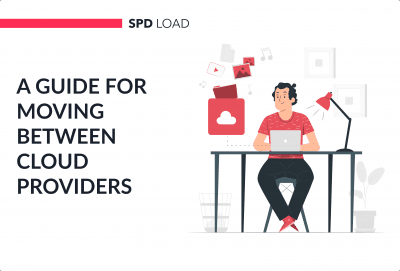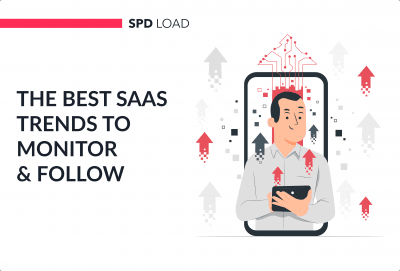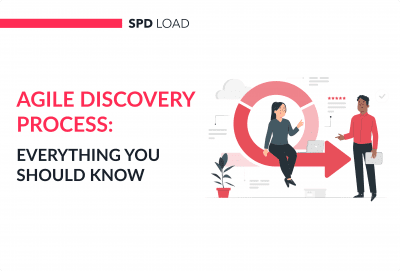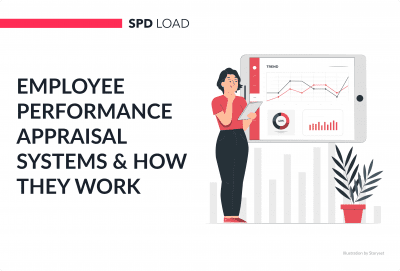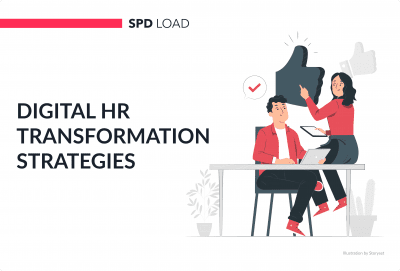FERPA: What Is It and How To Ensure FERPA Compliance?
- Updated: Sep 23, 2025
- 11 min
When building an elearning app or platform, businesses focus on features, usability, and monetization models.
But there’s another important aspect of educational app development you need to consider.
We’re talking about compliance. If your elearning app is targeting the US market then FERPA compliance is a must for you.
As education goes digital and remote learning becomes the norm, FERPA compliance has never been more important. Institutions must follow strict guidelines to protect student privacy from education records to directory information.
This blog provides an in-depth overview of FERPA, its significance, and how our team ensures compliance as a part of our elearning app development services.
Fuel your startup's growth with tailored mobile apps.
What is FERPA?
FERPA (The Family Educational Rights and Privacy Act) is a federal law enacted in 1974. This law protects the privacy of student educational records.
FERPA applies to any public or private elementary, secondary, or post-secondary school.
This law also applies to any state or local education agency that receives funds under an applicable program of the US Department of Education.
FERPA serves two primary functions: granting parents (and students 18 and older) access to information in the student’s education record and protecting such information from disclosure to third parties without parental agreement.
When providing our elearning software development services, we make sure that all the educational solutions we create comply with this law.
How Does FERPA Help Protect Student Data?
So, how does FERPA work?
We have already mentioned that FERPA gives parents the right to access their children’s education records and limits who else can see that information.
FERPA also gives parents the right to ask a school to correct inaccurate information in their child’s education records.
To protect student information, FERPA sets clear rules about who can access and share education records.
Under this law, schools and educational organizations, including eLearning platforms, must keep sensitive information private. Sensitive information covers grades, attendance, and personal data.
Educational institutions have to implement security measures to prevent student data from being accessed, disclosed, or tampered with.
This means implementing strict access controls, encryption and regular security audits to find and fix any system vulnerabilities.
This data can only be shared with third parties if parents or eligible students provide written consent (there are exceptions to this rule, like emergencies).
Also, educational institutions must make sure students and parents have specific rights to their education records.
These rights include the right to review and assess their records, the right to request corrections to any incorrect or misleading information and the right to control who can access their records.
Students and parents are allowed to review and correct the information if there are any inaccuracies.
To be Ferpa compliant, institutions must have clear policies and procedures in place to support these rights and ensure compliance.
- Secure student data
- Conduct regular security audits
- Give students and parents access to records
- Establish clear policies and procedures for handling education records
Why FERPA Compliance Matters
FERPA is incredibly important in educational app development.
According to the research on compliance from Fortra, non-compliance is much more costly than being compliant.
The average cost businesses faced due to non-compliance is $14.82 million. This is significantly higher than the $5.47 million spent on compliance. 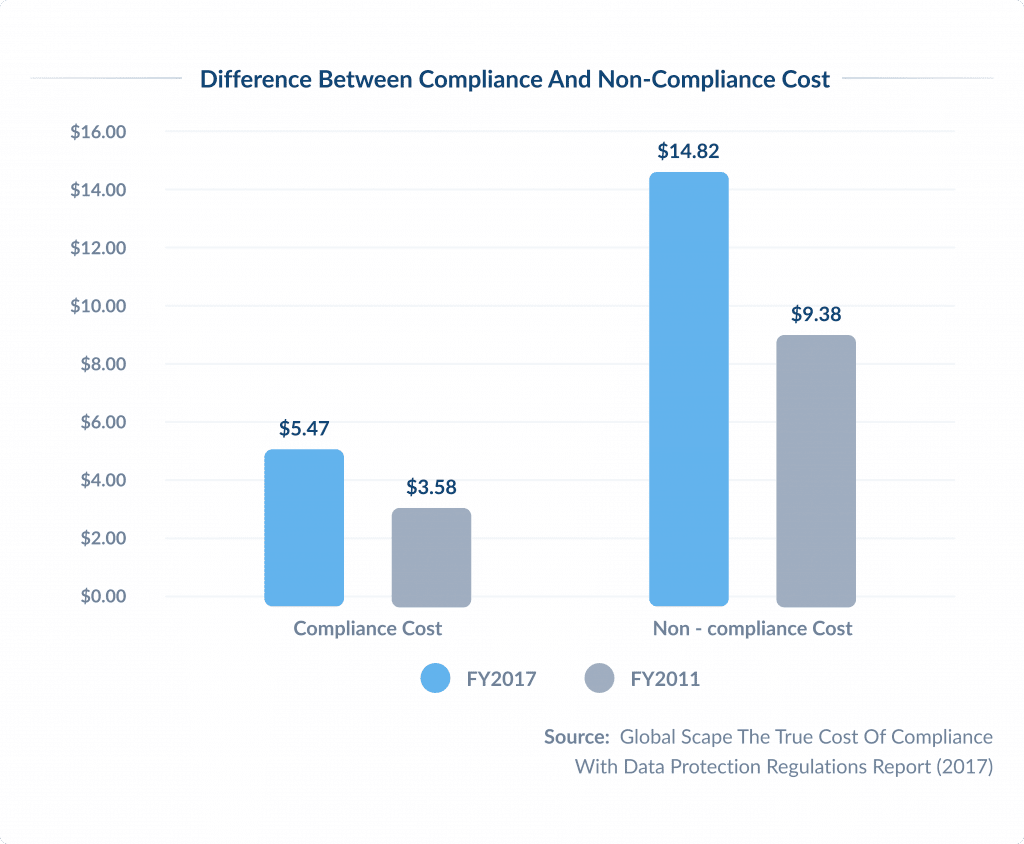
Keeping this in mind, FERPA compliance allows businesses not only to avoid substantial financial risks but also gives your platform a competitive edge in a competitive educational market.
Here is how:
Data Privacy
Schools and educational apps often collect student data like grades, student’s social security numbers, attendance, and even behavioral information.
FERPA mandates how this data can be collected, used, and shared to protect data privacy.
Compliance
Non-compliance with FERPA can have serious consequences for both edtech businesses and the educational institutions using their apps. This includes fines and potential legal action. We will explore FERPA violations and penalties further in the next chapters.
Building Trust
With FERPA compliance, education businesses build trust with schools, parents, and, most importantly, students. This trust is crucial for the successful adoption and use of educational technology.
In essence, FERPA acts as a crucial framework for responsible data handling in the education technology sector.
Advantages of FERPA Compliance
FERPA compliance offers numerous benefits to all the top education startups.
Here are some of them:
Keeps student data safe
FERPA ensures that sensitive information, like grades and personal details, is protected from unauthorized access or misuse.
Avoids big risks
Compliance helps you avoid hefty fines, lawsuits, and even the loss of federal funding by staying on the right side of the law.
Builds trust
When parents, students, and schools know their data is in safe hands, it strengthens their confidence in your platform or institution.
Improves teamwork
Knowing FERPA inside and out makes it easier to work with administrators, educators, and parents to ensure everyone is on the same page about data privacy.
Gives you a competitive edge
If you’re offering an eLearning solution, being FERPA-compliant makes your product more attractive to schools and universities.
Prevents fines and penalties
Regular checks and safeguards help catch potential issues before they turn into big problems, keeping you ahead of the game.
Encourages a privacy-first culture
FERPA compliance sets the tone for prioritizing privacy, ensuring everyone involved takes student data protection seriously. 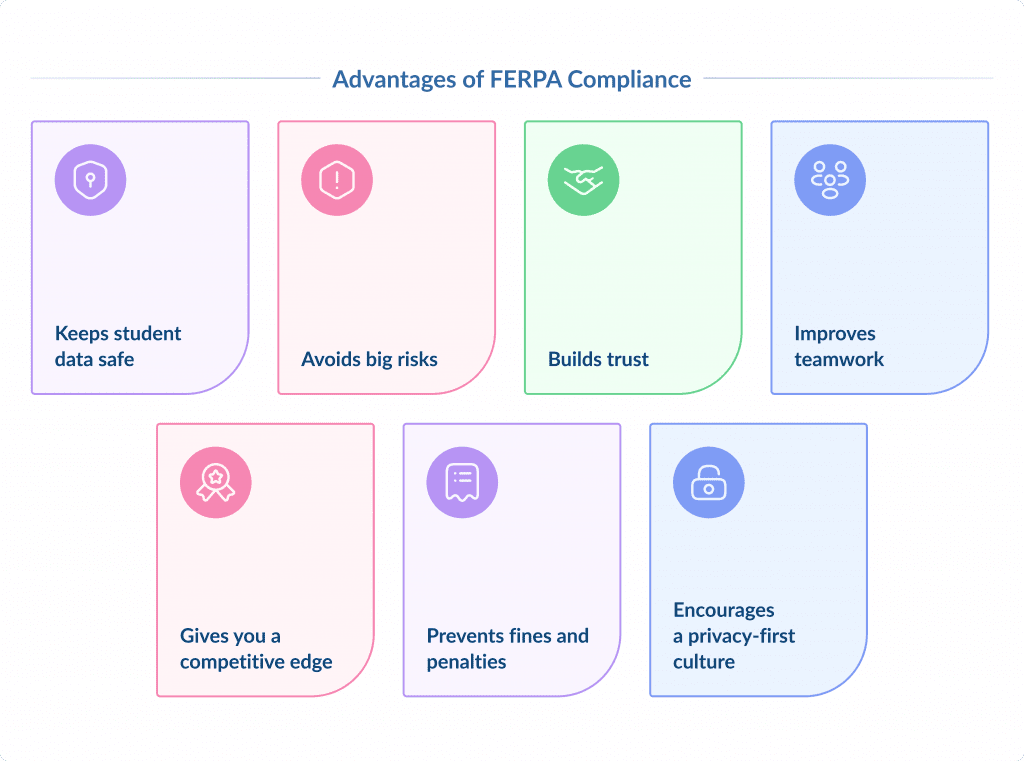
What is FERPA
FERPA protects student information.
An education record is a document about a student.
An education record is a document that is about a student and is kept by an educational agency or institution or by a person acting for such agency or institution.
Education records are any files or documents kept by the school system and are about a student.
Student records are any records about a student and kept by an educational institution or someone acting on its behalf.
FERPA applies to education records in any format – visual, audio or digital. They can be printed or handwritten.
These education records include:
- Grades and transcripts
- Class schedules
- Enrollment records
- Disciplinary records
- Standardized test scores
- Health and special education records kept by the school
- Financial aid records (if related to the student’s education)
- Counseling records (if kept by the school).
Personally Identifiable Information (PII)
This includes all student personal data:
- Student’s name
- Address
- Social Security Number
- Student ID or other student identifiers
- Parent or family member names
- Date and place of birth
- Photographs (if they could be used to identify the student)
- Other data that could identify a student indirectly, such as a combination of birth date and grade level.
Records Kept by a Third Party on Behalf of the School
- For example, records kept by a contracted learning management system.
FERPA does not apply to:
- Directory information (unless a parent or eligible student opts out). Directory information may include student’s name, address, phone number, email, dates of attendance and awards.
- Records in the sole possession of the maker (e.g., personal notes not shared with others).
- Law enforcement records kept by the campus police.
In general, FERPA prohibits educational institutions from sharing protected information without written consent from the parent or eligible student, unless in an emergency, court order or audit. 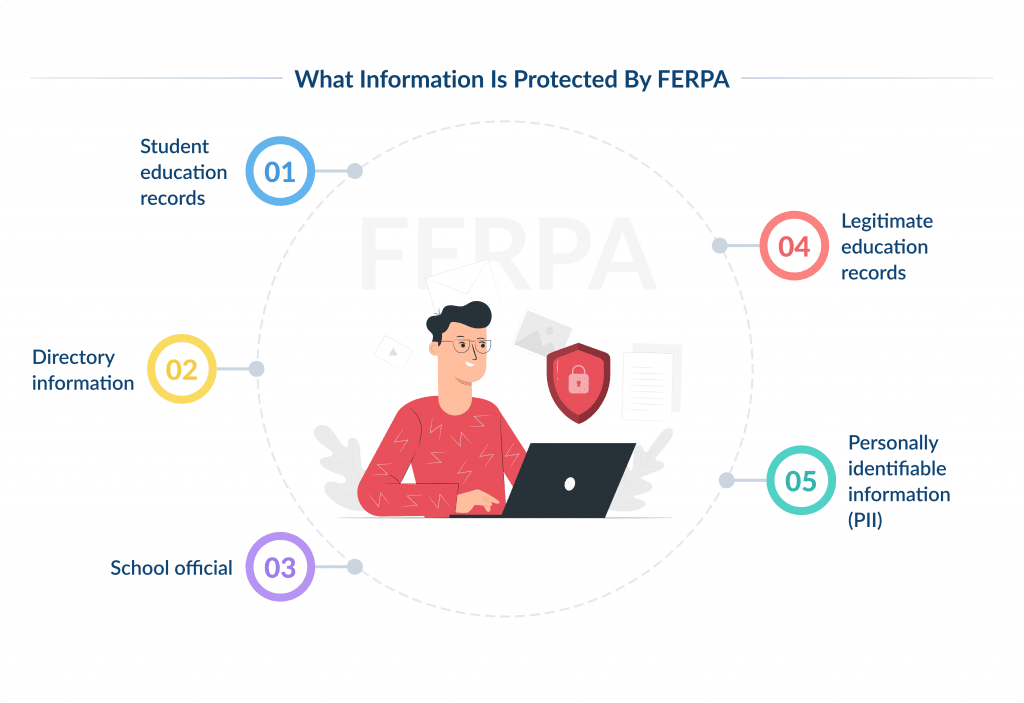
Eligible Student Rights
A student becomes eligible when they turn 18 years or enroll in a postsecondary institution, regardless of their age.
Under FERPA regulations, eligible students gain specific rights previously held by their parents.
This transfer of rights is a crucial aspect of FERPA as it allows students to control their education records and their privacy.
Here’s a more detailed breakdown:
What Are Eligible Student Rights Under FERPA?
These students have the right to:
- See their education records.
- Get copies of these records if they can’t see them in person, though schools can charge for copies.
These are the records they can see:
- Grades
- Transcripts
- Course schedules
- Financial aid records
- Disciplinary records
Request to Amend Records
If the student believes their education records contain information that is inaccurate, misleading, or otherwise inappropriate, they can request an amendment.
If the school denies the request, the student has the right to a hearing to resolve the issue.
For example, if a student notices an error in their disciplinary record or transcript and requests, they can require it to be corrected.
Disclosure of Personal Information
Students must give written consent before the school can disclose personally identifiable information (PII) from their education records, except in emergency situations (e.g. health or safety emergencies, court orders, or disclosure to school officials with legitimate educational interest).
How to File a Complaint
If the student believes their family educational rights have been violated, they can file a complaint with the U.S. Department of Education’s Family Policy Compliance Office (FPCO).
So, if a school or educational institution discloses education records without consent, the student can report the violation.
Opting Out of Directory Information
Students can request that the school not disclose directory information such as their name, email, or enrollment status.
This is done through a formal opt-out process, which prevents schools from releasing this information publicly.
Common FERPA Violations and Penalties
FERPA violations happen when companies to educational institutions fail to comply with its requirements to protect student records.
Companies and institutions can violate FERPA unintentionally or due to negligence. Despite the reason for the violation, the consequences can still be significant.
Here are the most common types of violations:
Unauthorized Disclosure of Personally Identifiable Information (PII)
When a company or institution shares student education records and personal information without written consent, it violates FERPA.
It can happen when they post grades publicly with identifiable information like student names or ID numbers.
Another example is when educational institutions share student records with unauthorized third parties, such as vendors or recruiters.
Improper Handling of Directory Information
As we’ve mentioned before, directory information (e.g., student name, address, phone number) can only be disclosed if the student or parent has not opted out.
Violations of sharing this personal knowledge include:
- Failing to honor a student’s opt-out request.
- Sharing directory information with outside parties without following proper procedures.
Lack of Proper Security Measures
When educational companies and organizations mishandle digital or physical student records due to weak security practices, they violate FERPA.
This is because sharing education records through unsecured platforms, like unencrypted emails or basic cloud storage, puts student information at risk.
These methods aren’t secure enough to protect sensitive data and make it easier for unauthorized people to access it.
This could lead to serious consequences, like data breaches or misuse of the information. And this is exactly what FERPA aims to prevent.
Not Providing Access to Records
When an educational institution or company delays access to student records beyond the 45-day limit, it goes against FERPA because it stops students or parents from quickly seeing their information when they need it.
FERPA gives them the right to review their records without unnecessary delays, helping to ensure everything is accurate and transparent.
Missing this deadline can lead to legal trouble for the institution.
While the law does not include criminal penalties or allow for private lawsuits, violations can lead to serious repercussions for schools and institutions.
The penalties include:
Loss of federal funding
The most severe penalty for FERPA violations is the potential loss of all federal funding. It includes grants and student loans.
This penalty is quite rare, and it usually happens when incompliance is ongoing and after warnings and corrective measures don’t work.
Investigations by the U.S. Department of Education (DOE)
Complaints are investigated by the DOE’s Family Policy Compliance Office (FPCO). If a violation is found:
The institution will be required to take corrective actions.
The DOE can monitor the institution for compliance over time.
Damage to institutional reputation
Violations, especially those that involve large-scale data breaches, can lead to public distrust.
Fines (In Indirect Cases)
While FERPA itself does not impose fines, other privacy laws like HIPAA or state privacy laws may apply in cases where FERPA overlaps. For example, mishandling health-related education records.
This can result in monetary penalties.
How to Avoid FERPA Violations
To avoid these issues, institutions should:
- Provide regular FERPA training to staff.
- Implement secure systems for managing and sharing student records.
- Honor student and parent requests related to directory information.
- Regularly audit their compliance with FERPA requirements.
FERPA violations can damage reputation and put federal funding at risk so handle student records carefully.
Let's shape your startup's product vision together!
Key Features of a FERPA-Compliant Remote Learning Solution
FERPA compliance is critically important in the context of eLearning software development.
eLearning platforms often handle sensitive student data, making them subject to FERPA regulations.
Compliance ensures the protection of student privacy, legal accountability for institutions, and trust among users.
Here’s why and how FERPA compliance plays a role:
Student data
eLearning platforms store and process tons of personally identifiable information (PII) – names, grades, attendance and more.
FERPA compliance keeps this data safe from unauthorized access or breaches.
Legal and financial risk
Non-compliance can mean severe penalties including loss of federal funding for institutions using the software.
Developers must not inadvertently cause FERPA breaches for their clients.
Trust with educational institutions
Schools and colleges prefer to work with software providers who put data security and compliance first.
Being compliant with this privacy act can be a competitive advantage in the eLearning space.
Scalability and international use
Many eLearning platforms aim to serve K-12 schools, colleges, and universities across the U.S.
Compliance ensures the platform is ready for broad adoption without legal risks.
How SpdLoad Supports FERPA Compliance
At SpdLoad, we understand that FERPA compliance is crucial for eLearning platforms, especially when handling sensitive student data.
That’s why when providing our elearning software development services, we make sure that all of our solutions include key features that protect privacy and maintain transparency.
We focus on secure data storage and access controls so that only authorized users can view or edit student information.
Our developers use encryption for data both in transit and at rest, ensuring that student records are always protected.
If needed, we provide tools to obtain written consent for sharing data and offer easy options for students and parents to opt out of sharing directory information.
We also track every action taken on student data with detailed audit logs, so schools can monitor who accessed or changed records.
For communication, we integrate encrypted messaging systems to protect sensitive information.
At SpdLoad, we’ve helped many clients build secure, compliant platforms.
For example, in a recent project with an education startup, we helped create an app that improves student reading skills.
The app allowed teachers to manage tasks and track progress, while students could easily monitor their learning journey.
With SpdLoad, you can trust that your eLearning platform will not only meet FERPA compliance but also provide a secure and reliable experience for students and educators.
The cost of developing an educational app can vary widely. Get a clear idea of what to expect with our guide to app development costs.
Wrapping Up
FERPA is a law that protects the privacy of student education records.
It gives students control over their data, ensuring that their information is not shared without consent.
Compliance with FERPA is crucial, especially for eLearning software developers, as failure to comply can lead to penalties and loss of trust.
Successful elearning apps are often the result of strong app development partnerships.
Our team at SpdLoad helps eLearning platforms stay FERPA-compliant.
We implement secure data storage, access controls, and audit trails.
If you want to utilize our app development services and create a secure educational solution that meets FERPA standards, contact us today.
We will get back to you in less than 24 hours to schedule a call and discuss your development goals.




